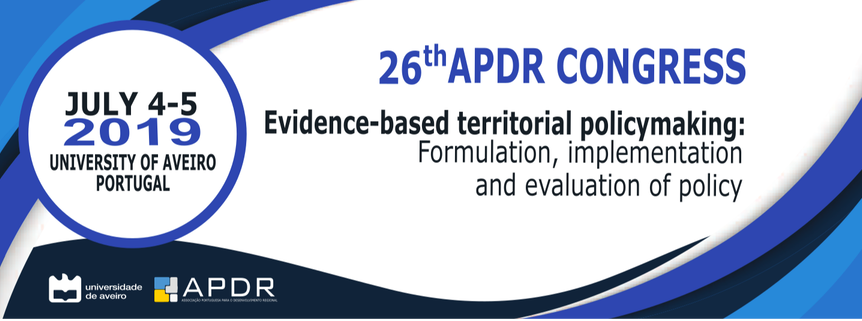
Participation in the 26th APDR Congress - 4th-5th July 2019 May 1, 2019
Organization of three special sessions in the 26th APDR Congress
"Políticas de Saúde e Ordenamento do Território"
“Decision support systems (DSS) to model urban transformation"
“Data and tools for advanced territorial analysis"
26th APDR Congress
The 26th APDR Congress will be held at the University of Aveiro, which hosted its first edition in 1990. This congress will allow a debate on the needs and challenges of territorialising public policies and on the role of (big) data, information and technologies in planning and regional development.
The lack of the territorial dimension in the formulation and implementation of sectoral policies, currently, coexists with efforts to implement decentralized policies. In this context, the development and evaluation of public policies faces an increasing number of challenges, not only because of the multidimensional nature of the problems, but also because of the unpredictability of factors and the way in which they interact. This justifies the need to involve a diversity of actors and knowledge and the use of information to better inform and support decision-making.
The ability to integrate and articulate technical and political criteria with motivational and preferential criteria of policy takers are necessary and required conditions to make collective decisions policy effective, efficient and sustainable. Additionally, new (big) data, continuously generated by information and communication technologies, justifies a major research effort to identify innovative and integrated methodologies for better using this type of input in the definition of regional and urban development policy, adapting them to specific territorial contexts.
Thus, the 26th APDR Congress emphasizes the interactions between three dimensions: i) data and information; ii) tools and models; iii) policies and instruments.
i). More and better territorial information:
in the context of the definition of regional development policies, discuss the big data and the existence of limitations in its use and availability and reflect on the use of small samples and adaptive models to support decision-making;
ii) Better Methodologies (Innovative and Integrated):
assess how information and communication technologies (ICT) can be used to meet the needs and expectations of populations and foster regional development dynamics;
iii) More effective regional development policies:
identify the needs and challenges posed by policy makers, institutions and enterprises, as well as society in general, for the qualification of the territories and improvement of people’s living conditions.




